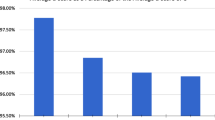Abstract
Many recent attacks on consequentialism and several defenses of pluralism have relied on arguments for the incommensurability of value. Such arguments have, generally, turned on empirical appeals to aspects of our everyday experience of value conflict. My intention, largely, is to bypass these arguments and turn instead to a discussion of the conceptual apparatus needed to make the claim that values are incommensurable. After delineating what it would mean for values to be incommensurable, I give an a priori argument that such is impossible. It is widely accepted that value is conceptually tied to desire. I argue that, more specifically, it is proportional to merited desire strength. This connection gives one a metric of all value if there is any such thing. This metric entails that value is a complete ordering over all states of affairs, or, in other words, that value is commensurable.
Similar content being viewed by others
References
Anderson, E. (1993). Value in ethics and economics. Cambridge, Mass: Harvard University Press
Author. (2004). Author’s Book (manuscript)
Broad, C. D. (1967). Five types of ethical theory. London: Routledge & K. Paul
Chang, R. (1997). Incommensurability, incomparability, and practical reason. Cambridge, Mass: Harvard University Press
Chisholm, R. (1986). Brentano and intrinsic value. Cambridge: Cambridge University Press
Ewing, A. C. (1966). The definition of the good. London: Routledge and Kegan Paul LTD
Hurka T. (1996). Monism, pluralism, and rational regret Ethics . Ap 106(3), 555–575
Kekes, J. (1993). The morality of pluralism. Princeton: Princeton University Press
Lemos, N. M. (1994). Intrinsic value: Concept and warrant. Cambridge: Cambridge University of Press
Nussbaum, M. C. (1990). Love’s knowledge: Essays on philosophy and literature. New York: Oxford University Press
Nussbaum, M. C. (2001). The fragility of goodness: Luck and ethics in greek tragedy and philosophy. Cambridge; New York: Cambridge University Press
Oddie, G. (2003). Value, Reality, and Desire (forthcoming).
Osborne, H. (1933). The Philosophy of Value.
Raz, J. (1986). The morality of freedom. Oxford [Oxfordshire] New York: Clarendon Press; Oxford University Press
Raz, J. (1999). Engaging reason: On the theory of value and action. Oxford; New York: Oxford University Press
Ross, W. D. (1939). The foundations of ethics. Oxford: The Clarendon Press
Schaber, P. (1999). Value pluralism: Some problems. The Journal of Value Inquiry 33, 71–78
Stocker, M. (1990). Plural and conflicting values. Oxford [England] New York: Clarendon Press; Oxford University Press
Williams, B.A.O. (1973). Problems of the self; philosophical papers 1956–1972. Cambridge [Eng.]: Cambridge University Press
Author information
Authors and Affiliations
Corresponding author
Rights and permissions
About this article
Cite this article
Kelly, C. The impossibility of incommensurable values. Philos Stud 137, 369–382 (2008). https://doi.org/10.1007/s11098-006-0005-5
Received:
Accepted:
Published:
Issue Date:
DOI: https://doi.org/10.1007/s11098-006-0005-5



